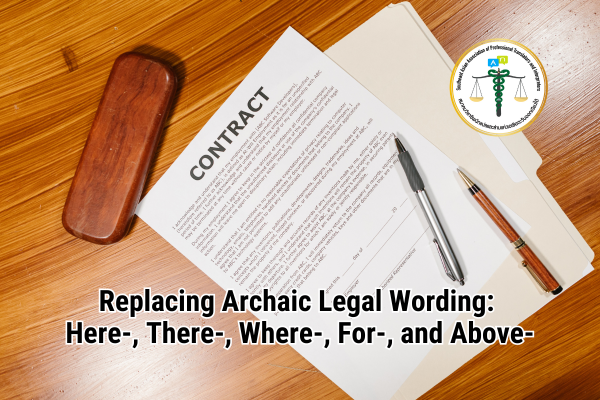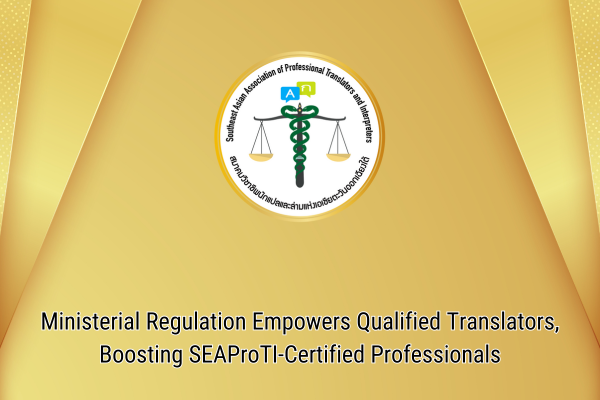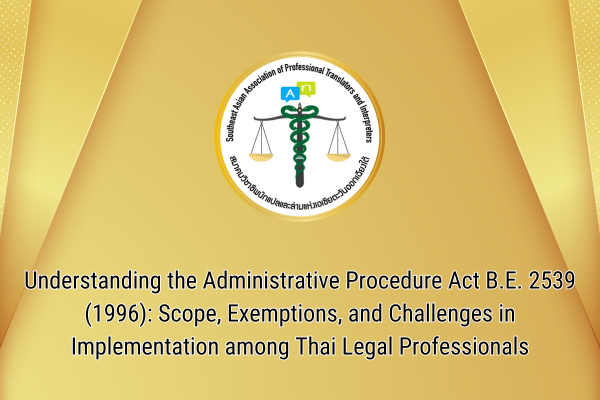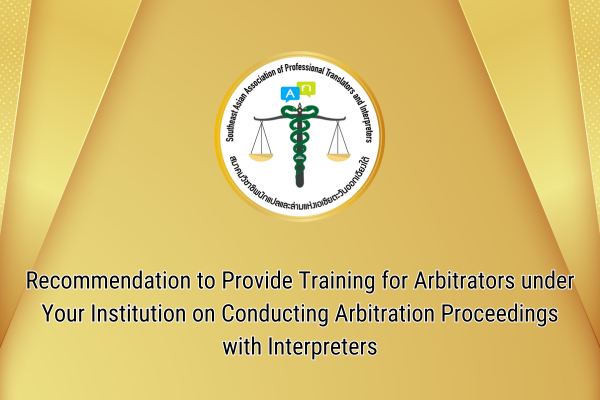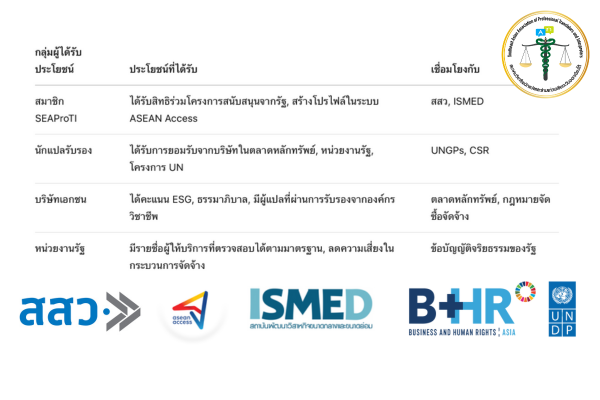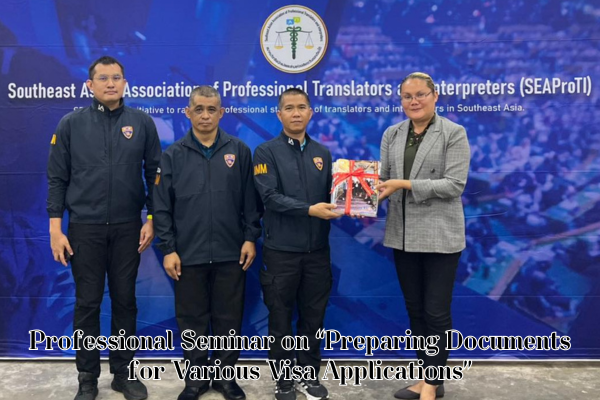Replacing Archaic Legal Wording: Here-, There-, Where-, For-, and Above-
25 February 2025, Bangkok – All English-speaking governments, the European Union (EU), and the Organisation for Economic Co-operation and Development (OECD) advocate for the use of plain English in legal documents. Nevertheless, many legal documents still contain archaic wording that reduces clarity and comprehension. This article will focus exclusively on legal compounds beginning with Here-, There-, Where-, For-, and Above- to highlight their impact and suggest clearer alternatives.
The Problem with Archaic Legal Wording
Legalese, or the traditionally complex style of legal writing, often includes terms that are no longer commonly used in modern English. This creates unnecessary confusion for clients, lawyers, and even judges. Many of these terms originate from the historical evolution of legal language, transitioning from Latin to French and finally to English.
The following categories represent some of the most persistent archaic compounds:
(1) Here- Words (e.g., Herein, Hereby, Hereafter, Heretofore)
Example: “The obligations stated herein shall be binding.”
Problem: The word “herein” is ambiguous—does it refer to this subsection, section, or the entire document?
Solution: Use clear references, e.g., “The obligations in this section shall be binding.”
(2) There- Words (e.g., Thereof, Thereby, Therefore, Therein)
Example: “Payments shall be made in accordance with the provisions thereof.”
Problem: Readers may be unsure what “thereof” refers to, leading to misinterpretation.
Solution: Specify the subject, e.g., “Payments shall be made in accordance with the provisions of this agreement.”
(3) Where- Words (e.g., Whereupon, Whereby, Wherein, Whereof)
Example: “The parties shall enter into an agreement whereby the supplier will deliver goods.”
Problem: The sentence structure is convoluted, making it difficult to understand.
Solution: Use simpler language, e.g., “The parties agree that the supplier will deliver goods.”
(4) For- Words (e.g., Forthwith, Forasmuch, Foregoing)
Example: “The tenant shall vacate forthwith.”
Problem: “Forthwith” is an outdated way of saying “immediately.”
Solution: Replace with “immediately” or “without delay.”
(5) Above- Words (e.g., Abovementioned, Above-stated, Above-referenced)
Example: “The abovementioned clauses shall apply.”
Problem: Vague references force readers to search for the related information.
Solution: Specify the subject, e.g., “Clauses 3 and 4 shall apply.”
Conclusion
Archaic legal wording persists in legal documents due to tradition, but modern legal writing prioritizes clarity. Replacing terms like “herein,” “thereof,” “whereby,” and “forthwith” with straightforward alternatives enhances comprehension and reduces legal disputes. Precision in legal language ultimately strengthens contracts and improves communication within the legal system.
SEAProTI’s certified translators, translation certification providers, and certified interpreters:
The Southeast Asian Association of Professional Translators and Interpreters (SEAProTI) has officially announced the criteria and qualifications for individuals to register as “Certified Translators,” “Translation Certification Providers,” and “Certified Interpreters” under the association’s regulations. These guidelines are detailed in Sections 9 and 10 of the Royal Thai Government Gazette, issued by the Secretariat of the Cabinet under the Office of the Prime Minister of the Kingdom of Thailand, dated July 25, 2024, Volume 141, Part 66 Ng, Page 100.
To read the full publication, visit: the Royal Thai Government Gazette
การแทนที่คำศัพท์กฎหมายโบราณ: Here-, There-, Where-, For- และ Above-
25 กุมภาพันธ์ 2568, กรุงเทพมหานคร – รัฐบาลที่ใช้ภาษาอังกฤษทุกแห่ง รวมถึงสหภาพยุโรป (EU) และองค์การเพื่อความร่วมมือและการพัฒนาทางเศรษฐกิจ (OECD) สนับสนุนการใช้ภาษาอังกฤษที่เข้าใจง่ายในเอกสารกฎหมาย ถึงกระนั้น เอกสารกฎหมายจำนวนมากยังคงมีคำศัพท์โบราณที่ทำให้ความชัดเจนและความเข้าใจลดลง บทความนี้จะเน้นเฉพาะคำประสมในกฎหมายที่ขึ้นต้นด้วย Here-, There-, Where-, For- และ Above- เพื่อชี้ให้เห็นผลกระทบและเสนอทางเลือกที่ชัดเจนกว่า
ปัญหาของคำศัพท์กฎหมายโบราณ
ภาษากฎหมาย หรือรูปแบบการเขียนกฎหมายที่ซับซ้อนแบบดั้งเดิม มักมีคำที่ไม่ได้ใช้กันทั่วไปในภาษาอังกฤษสมัยใหม่ สิ่งนี้สร้างความสับสนโดยไม่จำเป็นให้กับลูกความ ทนายความ และแม้แต่ผู้พิพากษา คำศัพท์เหล่านี้หลายคำมีที่มาจากวิวัฒนาการทางประวัติศาสตร์ของภาษากฎหมาย ซึ่งเปลี่ยนจากภาษาละติน ไปเป็นภาษาฝรั่งเศส และสุดท้ายเป็นภาษาอังกฤษ
หมวดหมู่ต่อไปนี้คือตัวอย่างคำประสมโบราณที่ยังคงพบเห็นบ่อย:
(1) คำที่ขึ้นต้นด้วย Here- (เช่น Herein, Hereby, Hereafter, Heretofore)
ตัวอย่าง: “ภาระผูกพันที่ระบุในที่นี้จะมีผลบังคับใช้”
ปัญหา: คำว่า “ในที่นี้” (herein) คลุมเครือ—หมายถึงส่วนย่อยนี้ ส่วนนี้ หรือทั้งเอกสาร?
ทางแก้: ใช้การอ้างอิงที่ชัดเจน เช่น “ภาระผูกพันในส่วนนี้จะมีผลบังคับใช้”
(2) คำที่ขึ้นต้นด้วย There- (เช่น Thereof, Thereby, Therefore, Therein)
ตัวอย่าง: “การชำระเงินจะต้องดำเนินการตามข้อกำหนดของสิ่งนั้น”
ปัญหา: ผู้อ่านอาจไม่แน่ใจว่า “ของสิ่งนั้น” (thereof) หมายถึงอะไร ทำให้เกิดการตีความผิด
ทางแก้: ระบุหัวเรื่องให้ชัดเจน เช่น “การชำระเงินจะต้องดำเนินการตามข้อกำหนดของสัญญานี้”
(3) คำที่ขึ้นต้นด้วย Where- (เช่น Whereupon, Whereby, Wherein, Whereof)
ตัวอย่าง: “คู่สัญญาจะทำข้อตกลงซึ่งโดยที่นั้นผู้จัดส่งจะส่งมอบสินค้า”
ปัญหา: โครงสร้างประโยคซับซ้อน ทำให้เข้าใจยาก
ทางแก้: ใช้ภาษาที่เรียบง่าย เช่น “คู่สัญญาตกลงว่าผู้จัดส่งจะส่งมอบสินค้า”
(4) คำที่ขึ้นต้นด้วย For- (เช่น Forthwith, Forasmuch, Foregoing)
ตัวอย่าง: “ผู้เช่าจะต้องออกจากสถานที่โดยทันทีทันใด”
ปัญหา: คำว่า “โดยทันทีทันใด” (forthwith) เป็นวิธีพูดที่ล้าสมัย แทนคำว่า “ทันที”
ทางแก้: ใช้คำว่า “ทันที” หรือ “โดยไม่ชักช้า”
(5) คำที่ขึ้นต้นด้วย Above- (เช่น Abovementioned, Above-stated, Above-referenced)
ตัวอย่าง: “ข้อกำหนดที่กล่าวไว้ข้างต้นจะมีผลบังคับใช้”
ปัญหา: การอ้างอิงที่คลุมเครือทำให้ผู้อ่านต้องค้นหาข้อมูลที่เกี่ยวข้อง
ทางแก้: ระบุหัวเรื่องให้ชัดเจน เช่น “ข้อ 3 และ 4 จะมีผลบังคับใช้”
สรุปส่งท้าย
คำศัพท์กฎหมายโบราณยังคงอยู่ในเอกสารกฎหมายเนื่องจากประเพณี แต่การเขียนกฎหมายสมัยใหม่ให้ความสำคัญกับความชัดเจน การแทนที่คำอย่าง “ในที่นี้” (herein), “ของสิ่งนั้น” (thereof), “ซึ่งโดยที่นั้น” (whereby) และ “โดยทันทีทันใด” (forthwith) ด้วยทางเลือกที่ตรงไปตรงมาจะช่วยเพิ่มความเข้าใจและลดข้อพิพาททางกฎหมาย ความแม่นยำในภาษากฎหมายจะช่วยเสริมความแข็งแกร่งให้กับสัญญาและปรับปรุงการสื่อสารภายในระบบกฎหมาย
เกี่ยวกับนักแปลรับรอง ผู้รับรองการแปล และล่ามรับรองของสมาคมวิชาชีพนักแปลและล่ามแห่งเอเชียตะวันออกเฉียงใต้
สมาคมวิชาชีพนักแปลและล่ามแห่งเอเชียตะวันออกเฉียงใต้ (SEAProTI) ได้ประกาศหลักเกณฑ์และคุณสมบัติผู้ที่ขึ้นทะเบียนเป็น “นักแปลรับรอง (Certified Translators) และผู้รับรองการแปล (Translation Certification Providers) และล่ามรับรอง (Certified Interpreters)” ของสมาคม หมวดที่ 9 และหมวดที่ 10 ในราชกิจจานุเบกษา ของสำนักเลขาธิการคณะรัฐมนตรี ในสำนักนายกรัฐมนตรี แห่งราชอาณาจักรไทย ลงวันที่ 25 ก.ค. 2567 เล่มที่ 141 ตอนที่ 66 ง หน้า 100 อ่านฉบับเต็มได้ที่: นักแปลรับรอง ผู้รับรองการแปล และล่ามรับรอง


